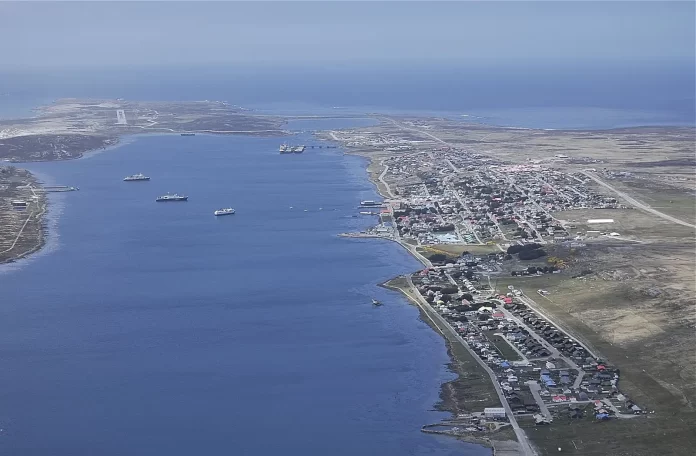Por: Gavin Shorts, Members of the Legislative Assembly (MLA), Falkland Islands***
Saludos desde las Islas Falkland. Ya casi hemos pasado la primavera y estamos a pocos días del verano, que ha resultado ser más fresco y húmedo que en años anteriores, lo que es una bendición después de las estaciones secas que hemos experimentado en los últimos años y creo que, a pesar de las temperaturas más bajas, el crecimiento de la hierba es bueno, lo que será bien recibido por nuestro sector rural.
La primavera y el verano, además de traer un mejor clima, también son la temporada de visitas, ya que nuestra temporada turística comienza. Hasta ahora hemos tenido la cantidad normal de cruceros de expedición que están mejor preparados para lidiar con las condiciones climáticas variables, pero el primer gran crucero que tenía previsto visitar las Falkland canceló las visitas dos días antes de la fecha prevista porque se había pronosticado un vendaval, un pronóstico que resultó ser cierto y las velocidades del viento en el día en que debería haber hecho una visita al puerto eran de una fuerza que habría hecho imposible realizar operaciones seguras.
Estos grandes barcos son mucho más propensos a las inclemencias del tiempo, especialmente a los fuertes vientos, algo que tenemos mucho en el Cono Sur, pero esperamos que el resto de las visitas programadas de estas ciudades flotantes sigan adelante, ya que su cancelación tiene un impacto económico para quienes participan en la industria turística.
El turismo terrestre también está aumentando, aunque existe la amenaza inminente de la gripe aviar, que está presente aquí, pero en niveles bastante bajos, pero si arrasa una colonia de pingüinos en uno de los destinos turísticos más populares de las Islas, esto podría llevar al cierre de la zona con las repercusiones económicas que seguirían.
También es el momento en que en las Falklands recibimos un flujo constante de visitas de políticos, personas influyentes, periodistas y ahora empresarios.
Uno de esos grupos estaba formado por 21 chilenos de sectores empresariales y de otros sectores de ese país que pasaron una semana aquí en las Islas por cuenta propia y que tuvieron un programa muy completo que abarcó desde visitas a lugares de interés hasta reuniones formales y recepciones en las que conocieron a todo el mundo, desde el sector empresarial de las Falklands hasta funcionarios del Gobierno, y que terminó el viernes por la noche con una reunión con nuestra comunidad Chilena, que representa entre el 8 y el 10% de nuestra población. La visita fue coordinada conjuntamente por la Corporación de Desarrollo de las Falklands y la Cámara de Comercio.
Me reuní con ellos en un ambiente formal y debo decir que todos eran personas muy encantadoras e interesadas en todos los aspectos de la vida aquí, así como en las posibilidades que pueden existir ahora o en el futuro para ampliar los niveles de negocios entre nuestros dos países, que lamentablemente han disminuido con el paso de los años, ya que el barco que solía navegar entre Punta Arenas y las Islas cambió de ruta y ahora utiliza Uruguay.
Este cambio, creo, fue causado por cuestiones económicas. En la reunión había gente (de ambos lados, incluyéndome a mí) que tenía buenos recuerdos de los días en que teníamos esos vínculos más estrechos con Chile y todavía extraño los productos chilenos que solían adornar nuestros supermercados y sería maravilloso si se pudiera encontrar alguna manera de ayudar a que volvieran.
Las Islas Falklands y Chile tienen una larga historia de vínculos, tanto a través del comercio como a nivel personal, que se remonta a casi 150 años, según tengo entendido. Por ejemplo, en 1876, la corbeta chilena Chacabuco transportó al gobernador de Magallanes, Diego Dublé Almeyda, a las Falklands, y regresó con una cantidad de ovejas, iniciando así el auge de la cría de ovejas en la Patagonia a fines del siglo XIX.
Curiosamente, la Chacabuco también estuvo comandado por Oscar Viel entre 1876 y 1881, que por supuesto es el nombre que se le dio al nuevo buque de investigación antártica de Chile y sería maravilloso si pudiera visitar las Islas en el futuro.
También estaba el Rippling Wave, cuya sección de proa se podía ver afuera de una oficina, justo al lado del Dreams Hotel en Punta Arenas, que hizo muchos viajes desde Punta Arenas a las Islas entre 1890 y 1909, transportando personas y bienes, así como llevando ovejas de las Islas de regreso a Chile.
En 1877, incluso teníamos un cónsul chileno en las islas, algo que sería beneficioso para nuestra población Chilena hoy y sería bueno que el gobierno Chileno pudiera resistir la presión argentina que seguramente vendría y restablecer el cargo en beneficio de su gente.
En los tiempos modernos, una de las cosas que ha hecho una gran diferencia en las Islas es nuestra conexión semanal a Punta Arenas y Santiago, que ahora está a cargo de LATAM, pero que fue iniciada desde Punta Arenas por Aerovía DAP.
Esto nos ha permitido hacer crecer nuestro sector turístico terrestre, tomar vacaciones en Chile, traer carga aérea y DHL y también enviar pacientes a Chile para procedimientos de diagnóstico médico. En los tres meses de julio a agosto, 25 personas de las Falkland fueron enviadas a Chile. Algunas fueron para realizar tareas de diagnóstico, mientras que otras habrían sido evacuadas por razones médicas.
Aquí en las Islas tenemos un buen servicio médico que es gratuito (aparte del trabajo dental cosmético) y recientemente ha sido inspeccionado independientemente y descrito como a la par con un nivel de atención médica privada en el Reino Unido, pero somos solo una población pequeña (3.500 de nosotros en el último censo) y no podemos atender todas las especialidades y en el caso de una emergencia médica que se puede estabilizar pero que no tenemos la capacidad de tratar, utilizamos las compañías chilenas Aerocardal y Los Cedros Aviación que transportan a la persona desde las Islas a Santiago para el tratamiento en la Clínica Alemana (todos los costos cubiertos por el Gobierno de las Falklands) y tengo mucho que agradecer de este enlace, ya que tuve un ataque cardíaco hace aproximadamente un año y medio y me estabilizaron en nuestro hospital antes de ser trasladado a Chile para un procedimiento, lo que significa que ahora estoy en forma nuevamente. No puedo elogiar lo suficiente la eficiencia de la ambulancia aérea y el trato de primera clase y la amabilidad y cariño que me mostró el personal de la unidad cardíaca de la Clínica Alemana.
Mucho gente de las Falkland también pasa sus vacaciones en Chile, que no solo implican hacer turismo y comer mucho, sino también muchas compras. No es inusual que la gente (yo incluido) viaje con poco en la maleta y use el descanso para llenar las maletas con las compras que hizo mientras estuvo en Chile.
Además, a lo largo de los años, hemos tenido una gran cantidad de personas de Chile que han venido a trabajar a las Islas y se han quedado. Algunos vinieron a trabajar en granjas, mientras que otros trajeron consigo habilidades muy necesarias, como carpinteros. Por ejemplo, en la década de 1960, entre los chilenos que vinieron a las Islas y a quienes llegué a conocer muy bien y que se quedaron para trabajar y criar a sus familias estaban el Sr. Almonacid (carpintero de barcos), el Sr. Miranda (carpintero) y el Sr. Molkenbuhr, que comenzó como trabajador agrícola y luego fue dueño de su propia granja. Ahora tenemos gente de Chile trabajando en muchos sectores en las Islas, desde gerentes de granjas, trabajadores agrícolas, dueños de hoteles, oficiales de policía, trabajadores bancarios, operadores de pubs, dueños de locales de comida rápida, tratamientos de belleza y la maravillosa gente que maneja Groovy’s, que es lo más parecido a un pub/restaurante chileno que se puede encontrar, y muchos de ellos crían a sus familias aquí y luego obtienen la ciudadanía de las Islas Falkland. También tenemos muchos matrimonios entre isleños y chilenos (yo incluido) y estos matrimonios fortalecen los vínculos y la cercanía con Chile.
Volviendo a la delegación comercial Chilena que nos visitó, algunos ya habían visitado el país antes, pero la mayoría no.
Lo que resultará de esta visita aún está por verse, pero al menos ahora tenemos 21 personas que han visto las Falklands por sí mismas y ahora pueden hablar con cierta autoridad sobre nuestro país, nuestra economía, nuestros deseos y nuestro estilo de vida.
Quisiera terminar esta columna pidiéndole a usted, el lector, que se comunique con Infogate si siente curiosidad por algún tema, para que pueda adaptar mis artículos ocasionales no solo a la vida en las Islas en general, sino también a temas que le interesen. Saludos. Nos vemos.
***“Las opiniones emitidas por los columnistas e invitados, son de exclusiva responsabilidad de quienes las emiten y no representan necesariamente el pensamiento o la línea editorial de Infogate”.
Greetings from the Falklands. We have passed nearly through spring and are but a few days away from summer which has proved to be cooler and wetter than in previous years, which is a blessing after the dry seasons experienced over the last few years and I believe that despite the lower temperatures, grass growth is good which will be welcomed by our rural sector.
Spring and summer, apart from bringing better weather is also the visiting season as our tourist season gets underway. So far we have had the normal amount of expedition cruise vessels who are better placed to deal with variable weather conditions but the first large cruise vessel that was scheduled to visit the Falklands called the visits off two days before they were due to arrive as there was a gale of wind predicted, a forecast that proved to be true and the windspeeds on the day that it should have had a port visit were of a strength that would have made safe operations impossible. These large vessels are much more prone to weather, especially high winds which is something that we have a lot of in the Southern Cone but hopefully the remainder of the scheduled visits by these floating cities go ahead as their cancelation does have an economic impact for those involved in the tour industry.
Land based tourism is also ramping up, although there is the looming threat from avian influenza which is present here but at fairly low levels but should it sweep through a penguin colony at one of the Falklands more popular tourist destinations, this could lead to the closure of the area with the economic impacts that would follow.
It is also the time in the Falklands where we get a steady stream of visits from politicians, influencers, journalists and now business people.
One such group was 21 Chileans from business and other sectors in that country who have spent a week here in the Falklands at their own expense and who have had a very packed programme which ranged from site visits through to formal meetings and receptions which has seen them meeting everyone from the Falklands business sector through to Government Officials and ended on Friday night with a gathering with our Chilean community who make up about 8 to 10% of our population. The visit was co-ordinated jointly the Falklands Development Corporation and the Chamber of Commerce.
I met with them in a formal setting and I have to say that they were to a person, all extremely charming and interested in all aspects of life here, as well as possibilities that may exists now or in the future to expand on the levels of business between our two countries which sadly have lessened over the years as the vessel that used to run between Punta Arenas and the Falklands switched routes and now uses Uruguay. This change was, I believe, caused by economics.
At the meeting there was certainly people there (on both sides and including me) who had fond memories of the days when we had those closer links with Chile and I still miss the Chilean products that used to grace our supermarkets and it would be wonderful if some way could be found to help their return.
The Falklands and Chile have had a long history of links both through trade and on a personal level going back nearly 150 years that I am aware of.
For example, in 1876 the Chilean corvette Chacabuco transported the Governor of Magallanes Diego Dublé Almeyda to the Falklands, returning with an amount of sheep, thus initiating the Patagonian sheep farming boom of the late 19th century. Interestingly the Chacabuco was also commanded by Oscar Viel between 1876 and 1881 which of course is the name given to Chiles new Antarctic research vessel and it would be wonderful if she was able to visit the Falklands in the future.
There was also the Rippling Wave, whose bow section could be seen outside of an office, just along from the Dreams Hotel in Punta Arenas who made a good many trips from Punta Arenas to the Falklands in the 1890s through to 1909 transporting people and goods as well as taking sheep from the Falklands back to Chile.
In 1877 we even had a Chilean Consul in the Islands, something that would be beneficial for our Chilean population today and it would be nice were the Chilean Government able to withstand the argentine pressure that would surely come, and re-instate the position in the interests of their people.
In modern times, one of the things that has made a huge difference in the Falklands is our once weekly connection to Punta Arenas and Santiago which is run now by LATAM but was initiated from Punta Arenas by Aerovia DAP. This has allowed us to grow our land-based tourist sector, take holidays in Chile, bring in airfreight and DHL and also send patients to Chile for medical diagnostic procedures. In the three months July to August, 25 persons from the Falklands were sent to Chile. Some were for diagnostic work whilst others would have been a medical evacuation.
Here in the Falklands we have a good medical service which is free (apart from cosmetic dental work) and has recently been independently inspected and described as being on par with a level of private healthcare in the UK but we are only a small population (3500 of us at the last census) and cannot cater for all specialities and in the case of a medical emergency which can be stabilised but that we do not have the capability to deal with, we use Chilean companies Aerocardal and Los Cedros Aviación who transport the person from the Falklands to Santiago for treatment in the Clinica Alemana (all costs covered by the Government of the Falklands) and I have a lot to be grateful for from this link as I had a heart attack about a year and a half ago and was stabilized in our hospital before being whisked over to Chile for a procedure which means that I am now fighting fit again. I cannot speak highly enough about the efficiency of the air ambulance and the first-rate treatment and friendliness shown to me by the staff on the cardiac unit at the Clinica Alemana.
People from the Falklands also take their holidays in Chile which involved not just sightseeing and a lot of eating but also a lot of shopping. It is not unusual for people (myself included) to travel with little in the suitcase and use the break to fill the suitcases with purchases made whilst in Chile.
Also, over the years we have had a great many people from Chile who have come to work in the Falklands and stayed. Some came to work on farms whilst others brought much needed skills with them such as carpenters. For example, in the 1960s among the Chileans who came to the Falklands and whom I got to know extremely well and who stayed to work and raise families were Mr Almonacid (shipwright) Mr Miranda (carpenter) and Mr Molkenbuhr who started as a farm worker and went on to own his own farm. Now we have people from Chile working in many sectors in the Falklands from a farm manager, farm workers, hotel owner, police officers, bank workers, pub operators, owners of fast food outlets, beauty treatment and the wonderful people who run Groovy’s which is as close to a Chilean pub/eatery as you can find, and many of those raise their families here and go on to take Falkland Islands citizenship. We also have many marriages between Islanders and Chileans (myself included) and these marriages strengthen the links and closeness to Chile.
Returning to the visiting Chilean trade delegation. Some have visited before but most have not. What will come of this visit remains to be seen but at the very least, we now have 21 people who have seen the Falklands for themselves and can now speak with some authority about our country, economy our wishes and way of life.
May I end this column by asking you, the reader, to contact Infogate if there is anything that you are curious about so that I can tailor my occasional pieces to be not just about life in general in the Falklands but subjects that are of interest to you. Saludos. Nos vemos.









